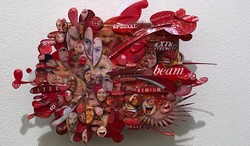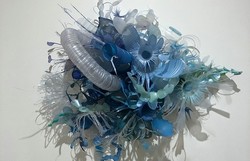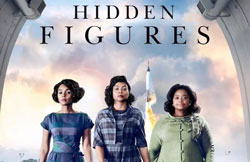Canadian-American artist Aurora Robson gave a lecture on her experiences cultivating works for her exhibit Inquire Within at the Wilson Hall Auditorium last Friday night, Feb. 7. The exhibit is being hosted at DiMattio Gallery in Rechnitz Hall until March 13.
Robson creates sculptures, paintings, and collages focusing on themes relating to the environment and humanity’s impact on it. She uses junk mail, plastic bottles, and other single-use everyday items as a medium. Robson’s work calls attention to the vast amounts of plastic pollution that is taking place on our planet, but she does not necessarily view the climate denial movement as something that has influenced her to make a statement in her work: “I don’t know that it has [influenced me]. I think it’s like when people want to say negative or derogatory or inflammatory things; if you focus on that, it will derail you,” said Robson. “I don’t know if I’d call [climate denial] a movement. I feel like I would call it the opposite; it’s like a wrench in the gears.”
According to Robson, her work is a part of a “love-based” fight, which is a narrative she values having in her current Hudson Valley residence, where she feels most of her fellow community members, “do not really understand why I do what I do.” The goal of this “fight,” according to Robson, is to convince “people to do things that are kinder and better for themselves and each other.”
The Toronto-born artist grew up in Hawaii, where she struggled with a rough home life throughout her childhood. “It was this beautiful paradise, with a wonderful landscape that I got to exist in while my father was in and out of jail, and my personal home life was very frightening,” said Robson.
 Robson struggled with recurring nightmares during this time; though these nightmares have also fueled some of her work, she would later learn they were commonplace amongst children living in traumatic households.
Robson struggled with recurring nightmares during this time; though these nightmares have also fueled some of her work, she would later learn they were commonplace amongst children living in traumatic households.
“I had discovered this in 2012, when I was doing a series of lectures with kids in a poor neighborhood of Columbus, Ohio. About a third of each classroom would go, ‘Oh my gosh, I had that dream last night!’ and it was this incredible ‘ah-ha’ moment in my career where I realized it wasn’t just me,” recalled Robson.
Robson wants children living in traumatic home settings to understand that unfortunate times are always temporary. “What I wish I had known [growing up], is that everything changes on a dime in terms of fortune; in both directions,” said Robson. “If things are really terrible one day, you can have stellar day the next day.”
Robson’s artistic process is just as much fueled by the plastic available in everyday life as it is by the experiences that have made her who she is today. “It is the wild west of the plastics industry still. It’s astounding to me how much variety there is; it’s like fractals. It’s continuous,” said Robson. “You’ve got this proliferation of plastic packaging constantly morphing; it gives it this lifelike quality that keeps me interested and engaged because it’s like interacting with an organism. It’s always growing new limbs and sprouting new colors and shapes.”
A plethora of Robson’s collage and sculpture work was on display at the DiMattio gallery. A collage titled Tryhards in Love exploded with the color red and carved labels from all sorts of commercial packaging. Labels from a box of Tylenol Extra Strength and half of Mr. Clean’s face were quite visible. A sculpture made from plastic debri, titled Fermi, attracted many eyes as it bloomed off the wall like a floral display. It is clear that Robson’s work portrays a lot of movement, with focal points generally taking the viewer’s eye throughout each piece.
Robson’s work has taken her and her family to many different corners of the world, which include but are not limited to Denmark, China, and the United Arab Emirates. “Knowing that [Aurora]’s relevant everywhere is exciting, I think, for our kids,” said Marshall Coles, Robson’s husband. “She definitely has made us all feel like it’s worth it, wherever we have to go. And wherever we do go, we’re welcome, usually with open arms.”
Coles hopes that the message behind his wife’s work continues to make a positive impact on the world in the long run. “It is challenging. Not just the distance, but preparing for the distance, and also preparing for the return. At the end of one of these experiences, we go back to our house and life as usual, which for most people is not playing by our rules or what we’re hoping people would listen to,” said Coles. “It’s sort of like the way you hope karma works. It’s not direct; it comes back to you at a much later date.”
PHOTOS TAKEN by Nick Manduley




